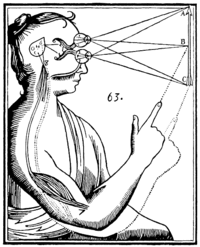
Photo from wikipedia
&NA; Self‐concept consists of self‐identity that distinguishes self from other people and knowledge that describes one's own attributes in different dimensions. Because self‐concept plays a fundamental role in individuals' social… Click to show full abstract
&NA; Self‐concept consists of self‐identity that distinguishes self from other people and knowledge that describes one's own attributes in different dimensions. Because self‐concept plays a fundamental role in individuals' social functioning and mental health, behavioral studies have examined cognitive processes of self‐identity and self‐knowledge extensively. Nevertheless, how different dimensions of the self‐concept are organized in multi‐voxel neural patterns remains elusive. Here, we address this issue by employing representational similarity analyses of behavioral/theoretical models of multidimensional self‐representation and blood oxygen level dependent responses, recorded using functional MRI, to judgments of personality traits, physical attributes and social roles of oneself, a close (one's mother) other, and a distant (celebrity) other. The multivoxel patterns of neural activities in the medial prefrontal cortex (mPFC) and posterior cingulate cortex (PCC) distinguished representations of the self from both close and distant others, suggesting a specific neural representation of the self‐identity; and distinguished different dimensions of person knowledge of oneself, indicating dimension‐sensitive neural representation of the self. Moreover, the pattern of PCC activity is more strongly coupled with dimensions of self‐knowledge than self‐identity. Our findings suggest that multivoxel neural patterns of the cortical midline structures distinguish not only self from others but also discriminate different dimensions of the self.
Journal Title: NeuroImage
Year Published: 2018
Link to full text (if available)
Share on Social Media: Sign Up to like & get
recommendations!